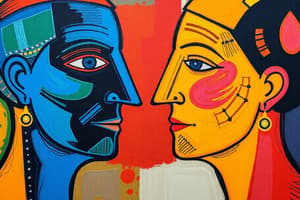Podcast
Questions and Answers
What is ethnocentrism?
What is ethnocentrism?
- Using your culture as a yardstick to judge other cultures (correct)
- Appreciating cultural differences
- Avoiding judgments about other cultures
- Understanding a culture on its own terms
What does cultural relativism promote?
What does cultural relativism promote?
- Judging other cultures
- Maintaining cultural superiority
- Understanding cultures on their own terms (correct)
- Encouraging ethnocentrism
What is material culture?
What is material culture?
Parts of culture that involve material objects.
What is non-material culture?
What is non-material culture?
What is culture shock?
What is culture shock?
What does symbolic culture refer to?
What does symbolic culture refer to?
What is a symbol in the context of culture?
What is a symbol in the context of culture?
What are gestures?
What are gestures?
What is the Sapir-Whorf hypothesis?
What is the Sapir-Whorf hypothesis?
What is a positive sanction?
What is a positive sanction?
What is a negative sanction?
What is a negative sanction?
What is ideal culture?
What is ideal culture?
What is real culture?
What is real culture?
Match the qualities of language with their descriptions:
Match the qualities of language with their descriptions:
What defines a subculture?
What defines a subculture?
What is counterculture?
What is counterculture?
What are values in the context of culture?
What are values in the context of culture?
Which of the following describes folkways?
Which of the following describes folkways?
What is cultural lag?
What is cultural lag?
What is cultural diffusion?
What is cultural diffusion?
How do Americans and other first world countries view ethnocentrism?
How do Americans and other first world countries view ethnocentrism?
Flashcards are hidden until you start studying
Study Notes
Ethnocentrism and Cultural Relativism
- Ethnocentrism: Evaluating other cultures based on one's cultural standards, often leading to negative perceptions.
- Example: Snobby tourists or the Pilgrims viewing native cultures as inferior.
- Cultural Relativism: Understanding a culture on its own terms without judgment, promoting respect and comprehension.
- Example: Organizations like Doctors Without Borders and the Peace Corps exemplify this concept.
Material and Non-Material Culture
- Material Culture: Involves tangible objects that are part of a culture.
- Examples: Clothing, art, food, and jewelry.
- Non-Material Culture: Comprises intangible aspects of culture.
- Examples: Religion, language, values, and symbols.
Culture Shock
- Culture Shock: A feeling of disorientation experienced when encountering a vastly different culture.
- Example: Realizing personal privilege when witnessing poverty in countries like Thailand or India.
Symbolic Culture and Symbols
- Symbolic Culture: Another term for non-material culture; involves aspects that cannot be physically touched.
- Examples: Religion, language, values, and symbols.
- Symbol: An object or concept that holds meaning for communication.
- Example: Language serves as a primary symbol for interaction.
Communication through Gestures and Language
- Gestures: Body movements used to convey information.
- Examples: Hand signals or specific gestures like the middle finger.
- Sapir-Whorf Hypothesis: Suggests that language influences thought and perception; comprehension requires knowledge of language.
Sanctions and Cultural Norms
- Positive Sanction: Rewards given for conforming to social norms.
- Example: Monetary reward for dressing appropriately.
- Negative Sanction: Penalties for violating norms.
- Example: Timeout for inappropriate behavior.
Ideal Culture vs. Real Culture
- Ideal Culture: Represents the aspirational values and norms of a society.
- Example: Concept of a perfect paradise like heaven.
- Real Culture: The actual behaviors and beliefs practiced in daily life.
- Example: Everyday societal norms.
The Importance of Language
- Qualities of Language:
- Facilitates communication.
- Enables memory retention.
- Supports planning.
- Shares collective ideas (e.g., religion).
- Achieves common goals.
Subcultures and Countercultures
- Subculture: A group with distinct values and behaviors that differ from the mainstream, but not in opposition.
- Example: Work subcultures with unique characteristics (e.g., outdoorsy people).
- Counterculture: A group that actively opposes the dominant culture.
- Example: The KKK represents a counterculture opposing societal norms.
Values and Norms
- Values: Standards that define what is considered attractive or desirable.
- Folkways: Mildly enforced norms; societal expectations that are more relaxed.
- Example: Dress conventions (e.g., men having short hair).
- Mores: Norms that are strictly enforced by society.
- Example: Expectation for gender-appropriate clothing.
- Taboo: Extremely strict norms that, when broken, result in severe societal condemnation.
- Examples: Acts like cannibalism or incest.
Cultural Dynamics
- Cultural Lag: Concept describing the delay in societal adaptation to new technological advancements.
- Example: The Amish lifestyle maintaining traditional practices despite modern technologies.
- Cultural Diffusion: The process through which cultural characteristics spread from one culture to another.
- Example: Adoption of a language across different countries.
Perspectives on Ethnocentrism
- Ethnocentrism is prevalent among Americans and other first-world nations, contributing to negative stereotypes and views of other cultures as inferior.
Studying That Suits You
Use AI to generate personalized quizzes and flashcards to suit your learning preferences.




